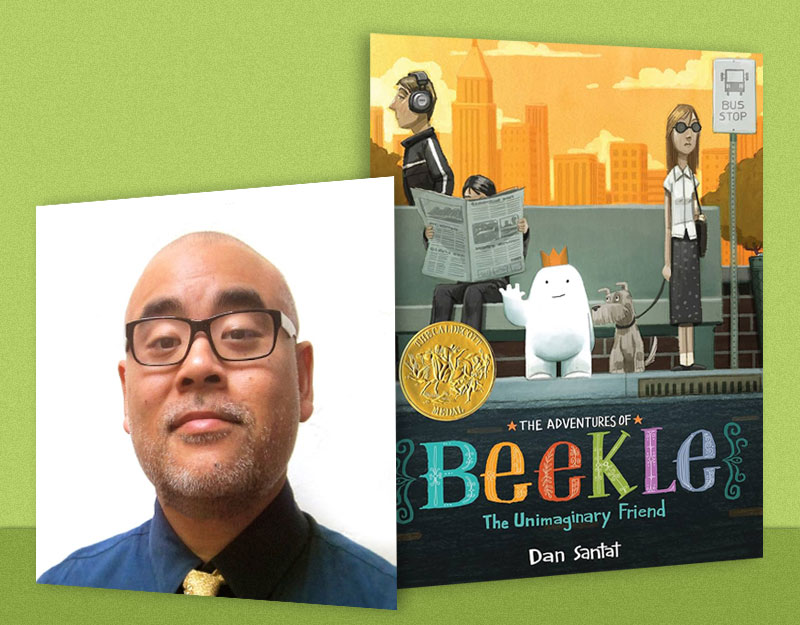5 Questions with Dan Santat
The 2015 Caldecott winner explains why the award should go to the illustrator and the author, and reveals his memorable middle-of-the-night DM from that year's Newbery winner, Kwame Alexander.

Winning awards can be life-changing. That’s definitely true if the honor is the Caldecott, Newbery, or Printz medal. SLJ asked past winners of the Big Three about their fondest memories of receiving the award, the biggest challenges after, and their words of advice for this year’s winners—who will be announced Monday, January 22 during the Youth Media Awards ceremony.
|
5 Questions with... |
Dan Santat recently won the National Book Award for Young People's Literature for his graphic memoir, A First Time for Everything, which is on many shortlists for this year's Newbery. But before all of that, he won the 2015 Caldecott Medal for The Adventures of Beekle: The Unimaginary Friend, which he also wrote.
Here Santat explains why the Caldecott should be awarded to the illustrator and the author, and reveals his memorable middle-of-the-night DM from that year's Newbery winner, Kwame Alexander.
For you, rules and criteria aside, what makes a book Caldecott worthy?
I think the thing that isn't said is that I feel like the award is supposed to be given to the "artist of the most distinguished American picture book for children" Librarians weigh on this judgment by the illustrations and how they work with the text and I've seen fabulously illustrated books that seem to have never gathered any recognition maybe perhaps because the words weren't deemed worthy for the award. I find it odd that this award be given only to the artist since it requires the words to be a tool measured to see if it is distinguished. With that said, and I don't say this to toot my own horn, but I think the award has always gone to the best picture book of the year. I feel the Caldecott should go to both author AND illustrator because I don't feel like the award has ever been truly just about the art.
What is your fondest memory of winning the award?
My fondest memory was maybe 48 hours after the announcement of the winners and I was still being showered with emails and direct messages from folks congratulating me. I remember being so happy that I couldn't really sleep for a few days and one evening at around 2 a.m. I got a direct message from Kwame Alexander, the Newbery winner that year, and he simply wrote "Are you having a hard time sleeping, too?" From there we chatted for almost an hour and ever since then we run into each other at other banquets and conferences and briefly catch up. I don't know if Caldecott and Newbery winners from the same winning years bond in that way but I'm glad we did.
What is the biggest challenge for an author after winning?
I think I may only speak for myself when I say that there's this feeling you have that you have to live up to the award and it can be a little soul-crushing for the first few months. You feel like all your work afterward has to be award-worthy which is a pressure that can cause great stress. You wonder if you're a flash in the pan or if you are capable of recreating something of that same caliber. There's this existential crisis where you reach the top of this metaphorical career summit and you find yourself asking where you go from there in order to feel joy in the craft of making books because now every book feels like it has to be perfect.
Any advice for this year’s winner?
One of the best pieces of advice I got after winning came from my friend and fellow writer, Bruce Coville. He said, "Look, William Shakespeare wrote some amazing work, but he also wrote a lot of bad stuff in between. You keep doing what you do, some of it is good, some of it will be bad, but you keep going and you continue to grow and never look back at what you could have done better, but most importantly, enjoy this achievement."
What are you working on now?
It's a long list. I'm illustrating about six other picture books for other authors as well as two middle grades. In terms of my own work, I'm working on three new books for my old 2010 graphic novel, Sidekicks, as well as a new graphic novel series for Macmillan which I'm writing and illustrating but I'm not at liberty to discuss yet. Meanwhile, I'm gathering new research material for another memoir, as well as attempting to write a middle grade novel about urban legends in Los Angeles.
RELATED
The job outlook in 2030: Librarians will be in demand
The job outlook in 2030: Librarians will be in demand
ALREADY A SUBSCRIBER? LOG IN
We are currently offering this content for free. Sign up now to activate your personal profile, where you can save articles for future viewing






Add Comment :-
Be the first reader to comment.
Comment Policy:
Comment should not be empty !!!